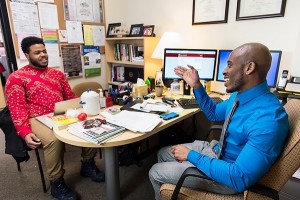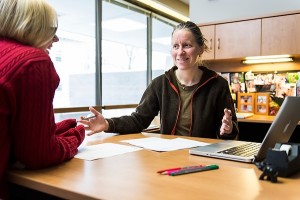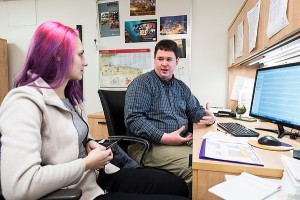The message to parents has been loud and clear since day one at SOAR (Student Orientation, Advising, and Registration): “Make sure your student meets with an academic advisor.” But since students meet with their advisors independently, parents may be curious about what an advising appointment really looks like.
To find out, we went behind the scenes with three academic advisors to get an insider’s look at a day in their lives.

7:30 a.m.
“I’m thinking about my appointments even when I’m brushing my teeth,” Quortne Hutchings says with a laugh. “My appointments sync to my iPhone so I check that right away in the morning. I like to get ready for the day by reminding myself what classes they were interested in or what we covered the last time we met,” says Hutchings, an advisor to students who are part of the Pre-College Enrichment Opportunity Program for Learning Excellence (PEOPLE), run by the Division of Diversity, Equity and Educational Achievement.
8 a.m.
Hutchings arrives at his office in the William S Middleton Building. Over a cup of coffee, he scans his notes about the students he’ll be meeting with that day. “The number of students I see depends on the time of year,” he says, explaining that the peak months are during enrollment in November and April. “Today I’ll be seeing fourteen students, back to back all day —and that’s why it’s crucial for students to make appointments well in advance. I work with over one hundred students.”
Hutching’s office is warm and welcoming, with photos of graduating classes, his family, and an assortment of thank-you cards brightening up his back wall. Two diplomas are proudly displayed above his computer: one is from his undergraduate degree in African-American studies from Penn State; the other is for his master’s degree in education and policy from the University of Illinois at Urbana-Champaign.
It’s clear that Hutchings arranged the front half of his desk with students in mind. A cup of pens and pencils, business cards, a box of tissues, a bowl of mints, and a digital clock are all oriented toward the student seat. “I want it to be a home away from home,” he explains, gesturing to a jar stuffed with candy.
8:30 a.m.
Appointments for Hutchings start rolling in. Many of his students have come in to talk about the basics — reading their Degree Audit Reporting System (DARS) reports, removing holds on their accounts, talking about courses they want to take. But enrollment season is a only a few months out of the year. By December, for example, students have registered for the next semester, and they come in to talk about anything — and everything — else.
Each student Hutchings sees has a unique set of questions and concerns, ranging from how to prepare for graduate school, to how to deal with a messy roommate, to how to talk to a professor or teaching assistant.
A student tells Hutchings that he is intimidated to go to his professor for help, and he doesn’t know where to start. Hutchings begins by coaching the student in email etiquette, giving him some tips on how to write the salutation and reminding him to avoid informal language. Then he suggests that they role-play the conversation, encouraging the student to talk to him as though he’s the professor. Although Hutchings sometimes gives students “homework,” he generally has them follow through with an action right away. In this case, Hutchings has the student look up the professor’s contact information using his second monitor and wireless keyboard, and then hands him the phone. Hutchings explains that getting students to take that first step with him helps them develop their confidence to take initiative in the future.
“The other week I helped a student prep for his day-long interview in Chicago,” Hutchings says. “We didn’t just do a practice interview — I challenged him to consider every little detail, down to what to eat during lunch. Soup you can spill, pasta splatters. I suggested a salad.” He adds that advisors can serve as mentors, professionals who have been through it all before and who can guide students through the process, whether it’s related to or outside the academic realm. “I must have given him good advice,” Hutchings says with a grin, “because he called back to let me know he got the job.”
9:30 a.m.
Just one floor down from Hutching’s office, Susan Nelson is helping a student with a mock interview. Nelson works in the Center for Pre-Health Advising (CPHA), a department that was founded in 2010 to help students prepare for health-profession programs. Nelson wrote the grant that created the center, recognizing that students pursuing careers in the health fields needed extra support as they apply to competitive professional schools.

A little later, a student comes in to talk about her plan to take the Medical College Admission Test (MCAT) this summer. Nelson enthusiastically shares the latest information, bringing the student up to speed on what to expect from the 2015 MCAT. Nelson also pulls up a revamped website and walks her through the different sections as she suggests strategies to review for the rigorous test.
Advisors in CPHA keep up to date on the latest trends and changes in admission processes, and help students find research opportunities and scholarships, compare volunteer options, and write application essays and statements of purpose.
10 a.m.
During her next appointment, Nelson encourages the student to take a look at a philosophy course that focuses on bioethics, explaining how having a well-rounded background in the “people side” of medicine is important.
The hardest thing for some students, Nelson says, is balancing studies in their field of interest with classes that will support their personal development. “Humanities often get pushed to the backburner, unfortunately,” she says, explaining that at times, pre-health students can hone in on acquiring a strong bioscience background, but feel that other fields are irrelevant. She explains that this attitude can be detrimental when it comes time to write a statement of purpose. Students can produce a checklist of what they’ve done, but can have a difficult time articulating why they chose the health field, or what they gained from their courses and outside involvement.
Nelson is able to speak to the benefits of the humanities, reflecting on her personal experience. She received her undergraduate degree in history and economics with a minor in French, and went on to earn her Ph.D. from UW–Madison in European history. “A course in sociology might help a student understand how to work with patients from a different socioeconomic background,” she explains. “An ethnic studies course can help them develop their cultural competency. A psychology course can provide the insight to understand and connect to patients.”
10:30 a.m.
Later in the morning, Nelson switches from advising to administration. In addition to serving as an advisor for pre-health, she also directs the department. Many advisors have dual roles on campus.
UW–Madison has numerous advising offices that specialize in particular areas, such as study abroad, careers, pre-law, and pre-business, and offices that help transfer and international students, and those who haven’t declared a major. Then there are population-specific advising offices that work with student athletes, non-traditional students, or first-generation students, to name a few.
These different options are the reasons Nelson tries to make sure her students know the importance of building a network of advisors and professional contacts outside of their assigned academic advisor. As Hutchings likes to tell his students, “Make your network your net worth.”
11:15 a.m.
Back on the second floor, Hutchings helps students think about the big picture as they choose next semester’s courses. He tells his students, “Picking classes is like having a meal,” using the metaphor to help students develop a balanced course load and save a little room for exploration.
Hutchings feels his own path helps him connect with students who are struggling with which direction is right for them. “I changed my major seven times,” Hutchings admits, “so I know what my students are going through. There is a ton of pressure on them to make a quick decision, but that can end up hurting them if they rush into a major and find out their senior year, ‘This isn’t for me.’ ”
1 p.m.
Downstairs, Nelson is planning the agenda for the next meeting for the Committee for Pre-Health Advising. Part of Nelson’s dual role is collaborating with other advising offices on campus. Committee members include more than thirty advisors who work with students in majors that prepare students for health-related careers. Several blocks over from Nelson’s office, in the Microbial Sciences Building, one of the committee’s members, biology advisor Brian Asen, is hard at work with a full afternoon of appointments.
1:15 p.m.
Asen spends his afternoon in back-to-back meetings with students who have a variety of questions. Some — such as, “How do I run a what-if analysis on my DARS report?” — take only a few minutes. Some are much more complicated topics, such as, “I think I should switch my major.”
In between appointments, Asen has a few minutes to enter notes into a database that allows advisors to document what they talked about with students. This helps different advising offices communicate with each other, given that students often work with more than one advisor.

“In the morning or in between appointments, I print out my students’ current DARS reports, which list their past courses and courses they still need to take for their major, which is extremely useful,” Asen says, commenting on the impact technology has on advising, but emphasizes that it’s the conversation with the student that’s the most instrumental part of his job.
Asen says that while knowledge in the content area is important (he worked for six years for the Center of Biology Education), he believes that his background in teaching truly gives him the skills to be a great advisor. “Advising is about engaging students in conversations about their career plans, asking them what they’re getting out of their classes. Advisors are here to help students learn how to put all the pieces together,” he says.
2 p.m.
After a few more appointments, Asen heads to a meeting for the Council on Academic Advising (CAA). The CAA is made up of more than thirty advisors who represent different advising offices. It focuses on building communication among advising offices and working on initiatives that strengthen the advising experience for all students.
Today the meeting discusses the student advising website that will be launched in the spring. Advisors work in small groups to define student and advisor roles, and brainstorm ideas for a checklist students can use to prepare for appointments. The room buzzes with conversation and pens scribble rapidly on the handout that will be collected and used to create some of the website’s content.
3 p.m.
After returning to his office, Asen takes a few minutes before his next appointment to browse upcoming professional development opportunities for advisors. He and his colleagues receive training from their individual units, but also they have the opportunity to participate in training developed by the Office of Undergraduate Advising. Established in 2011, the office strives to improve the undergraduate advising experience by supporting advisors across campus with coordinated training, communication, assessment, and technology. Trainings cover topics ranging from the process of transfer credits, to cultural competency, to how to use many of the online tools that support advising.
5 p.m.
At the end of the day, Asen reflects on his recent appointments, and he feels a sense of satisfaction knowing he has made an impact. “The only hard thing about my job is wishing I could do more, wishing I could help those students who waited too long to see me,” he says. “I can’t help them if they don’t come in.” His advice to students? “Make an appointment, make it early. We’re here to help.”
Hutchings says that some problems are difficult. “That’s the hardest part of the job — when students struggle with family issues, illness, break-ups, and you can’t do much other than listen.” But, he adds, it’s also good to know students feel like they have someone on campus who cares about them and who they feel comfortable going to with their problems.
When asked what they would most want parents to know about advisors, Hutchings, Nelson, and Asen are unanimous: advisors care deeply about the education and success of their students, and they strive to give them the tools to make the most out of their undergraduate experience.
Hutchings also urges parents to engage their students in conversations about academics and campus involvement. “Ask what classes they’re enjoying, and why,” he suggests. “What intrigues them? Are they making friends, are they getting connected?”
But don’t forget, he says, to keep asking the most important question: “So, have you been meeting with your advisor?”
Buy a ticket, support Undergraduate Advising at UW–Madison! Proceeds from the 2015 Badger Football Spring Game on Sat. April 25 will help strengthen and expand undergraduate advising. Tickets are just $5, and can be purchased online at www.uwbadgers.com/tickets.